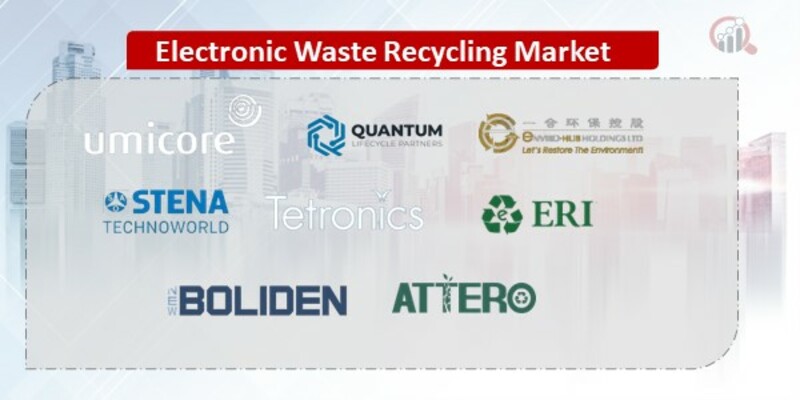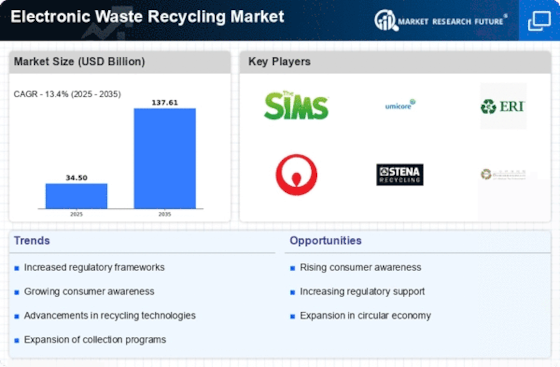Top Industry Leaders in the Electronic Waste Recycling Market

*Disclaimer: List of key companies in no particular order
Competitive Landscape of Electronic Waste Recycling Market
The global electronic waste (e-waste) recycling market is a burgeoning giant, propelled by the relentless march of technological advancements and growing environmental consciousness. But within this fertile terrain lies a complex competitive landscape, where established players clash with nimble newcomers, all vying for a piece of the ever-growing pie. To successfully navigate this intricate ecosystem, understanding the competitive landscape is crucial.
Some of the Electronic Waste Recycling companies listed below:
- Umicore SA
- Quantum Lifecycle Partners
- Enviro-Hub Holdings Ltd
- Stena Technoworld AB
- Tetronics International Limited
- Electronics Recyclers International Inc.
- Sims Limited (US), Aurubis AG
- Boliden AB
- Attero Recycling Pvt. Ltd
- Great Lakes Electronics Corporation
Strategies Adopted by Key Players:
- Investment in Technology: Advanced sorting, dismantling, and extraction technologies allow for efficient processing and high recovery rates of valuable materials like precious metals and rare earth elements.
- Sustainability Focus: Minimizing environmental impact through energy-efficient operations, responsible waste disposal, and exploring greener solutions like biohydrometallurgy for metal extraction.
- Regulatory Compliance: Adapting to evolving regulations and expanding into regions with stricter compliance requirements.
- Partnerships and Acquisitions: Collaborating with waste collection companies, electronics manufacturers, and other stakeholders to broaden reach and gain expertise.
- Data-Driven Approach: Utilizing data analytics to optimize logistics, improve operational efficiency, and personalize service offerings for different customer segments.
Factors for Market Share Analysis:
Assessing market share in the e-waste recycling market requires a multifaceted approach. While traditional metrics like revenue and processing volume play a role, other crucial factors must be considered:
- Geographic reach: Regional regulations, infrastructure development, and consumer preferences vary significantly. Companies with a strong presence in key growth markets like Asia and Africa hold an advantage.
- Technology and innovation: Efficient and responsible recycling processes are critical. Players employing advanced technologies like hydrometallurgy and automated sorting systems gain an edge in resource recovery and environmental impact reduction.
- Collection infrastructure: Access to convenient and efficient e-waste collection channels – drop-off centers, reverse logistics programs, or partnerships with retailers – is essential for attracting and retaining customers.
- Sustainability practices: Consumers are increasingly conscious of ethical and sustainable practices. Companies demonstrating responsible e-waste management, including fair labor practices and pollution control measures, attract a growing customer base.
- Vertical integration: Companies able to control multiple stages of the e-waste value chain, from collection to processing and material recovery, gain greater operational efficiency and cost control.
New and Emerging Companies:
The e-waste recycling market is witnessing the emergence of new players alongside established giants. Startups and tech-driven companies are challenging traditional methods with innovative solutions:
- Decentralized recycling: Startups are developing modular and portable recycling units that can operate closer to e-waste sources, reducing transportation costs and environmental footprint.
- Blockchain technology: Blockchain platforms are being explored to ensure transparency and traceability throughout the e-waste value chain, fostering trust and responsible practices.
- AI-powered sorting: Companies are implementing AI-powered sorting systems that can accurately identify and categorize different types of e-waste, improving efficiency and resource recovery rates.
- Circular economy models: Forward-thinking companies are developing closed-loop systems where recovered materials are directly used in new product manufacturing, minimizing waste and maximizing resource utilization.
Latest Company Updates:
The BPCL launches the E-Waste Management Initiative in 2023 to strengthen the SDGs even more. In order to effectively manage their organization's e-waste, including prompt disposal in accordance with the law, they have issued a directive on the subject. As part of its sustainability initiatives for the reduction and recycling of e-waste, Bharat Petroleum Corporation Limited (BPCL), a "Maharatna" and Fortune Global 500 Company, today announced the launch of a special project called "Sound Management of Waste Disposal (SMWD)."
Dialogue Axiata PLC, one of its product responsibility initiatives, began the e-Kunu programme in 2023 with the goal of revolutionising e-waste management in Sri Lanka by collecting and sustainably recycling electronic waste through Dialogue Customer Experience Centres island-wide. e-Kunu expands beyond mobile waste to include a wide range of electronic items, building on the success of Dialog's National "mWaste" Project, which started in 2008 and eventually became a part of the National E-waste Programme in 2014.
The start of the Sustainable Tech Recycling programme for enterprises has been announced by electronic waste and tech recycling company Zolo for 2023. The programme, according to Zolo, is a reflection of the business's dedication to environmental sustainability and efforts to lessen its carbon footprint. The Sustainable Tech Recycling programme for businesses has been launched by Zolo, a firm that prides itself on balancing profit and purpose. This initiative reflects the company's dedication to environmental sustainability and its attempts to lower its carbon footprint.










